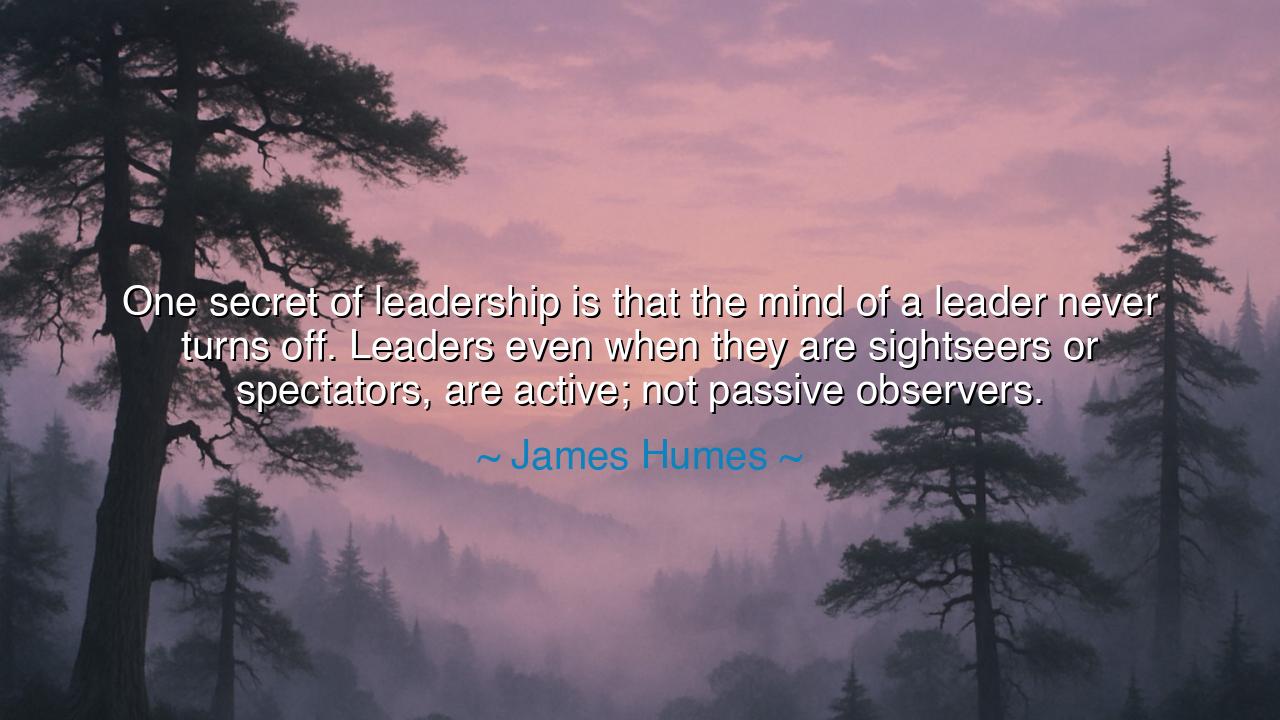
One secret of leadership is that the mind of a leader never turns
One secret of leadership is that the mind of a leader never turns off. Leaders even when they are sightseers or spectators, are active; not passive observers.






When James Humes, the speechwriter and historian who helped craft the words of presidents, said, “One secret of leadership is that the mind of a leader never turns off. Leaders even when they are sightseers or spectators, are active; not passive observers,” he revealed a truth that echoes through the ages — that leadership is not a position, but a state of mind. His words unveil the essence of those who shape history: that even in stillness, their thoughts move like rivers beneath the surface, seeking patterns, meaning, and opportunity. The true leader, Humes teaches us, never drifts into idleness; he sees in every moment a lesson, in every face a story, and in every event a chance to understand the world more deeply.
This quote arises from the wisdom of a man who stood close to power and watched it in its purest form. James Humes wrote for Dwight D. Eisenhower, Richard Nixon, and Ronald Reagan, and in doing so, he witnessed how the great leaders of the modern age carried the weight of their nations even in their quietest hours. What he observed was not restlessness, but responsibility. The mind of a leader is always awake because it carries not only personal ambition, but the hopes of others. The leader’s eyes see what others overlook; their heart listens even when all seems silent. To lead is to live in a state of perpetual awareness, where learning never ceases and reflection never sleeps.
This eternal vigilance has been the mark of every great figure in history. Alexander the Great, even as a youth, studied the terrain of every land he crossed, not only with his eyes but with his mind. He questioned his teachers, his soldiers, and his enemies alike, learning from each encounter. He could sit by a river and see not merely its beauty, but its potential as a route of conquest or trade. Similarly, Leonardo da Vinci, though called an artist, was in truth a leader of thought — for even when he gazed upon a bird in flight, his mind asked how man might soar as well. Humes’s insight is born from this same timeless truth: the leader is never merely watching life, but interpreting it, transforming experience into wisdom.
The passive observer drifts through existence, content to be entertained, while the leader transforms observation into strategy. Where others see an event, the leader sees a pattern; where others see chaos, the leader searches for order. This quality does not rest, for the world never ceases to teach those who are willing to learn. In moments of peace, the leader’s mind prepares for the next trial; in times of crisis, it draws from the quiet lessons of observation. To be a leader, then, is to live as both student and sentinel — always alert, always perceiving.
But such constant awareness is not a burden; it is a calling. The leader’s mind, though ever active, is not tormented, for it moves with purpose. Like a craftsman shaping stone, the leader shapes thoughts into actions, dreams into deeds. Awareness, for such a person, is not anxiety but strength. To see the world clearly — its pain and its promise — is the first duty of one who guides others. Humes reminds us that leadership is not confined to speeches or commands; it begins in the quiet mastery of one’s own perception.
Consider the story of Winston Churchill, who, even in his leisure, carried the gaze of a leader. When he painted landscapes, he was not escaping duty; he was studying light, contrast, and patience — the same virtues that guided his leadership in war. When others rested, he reflected; when others doubted, he discerned. His mind never turned off, for he understood that the art of leadership is the art of seeing — of observing with both intellect and empathy. Churchill, like all true leaders, lived what Humes described: the discipline of active thought even amid repose.
The lesson of Humes’s words is both demanding and noble: never allow your mind to grow dull. Whether you lead nations or only yourself, cultivate the habit of awareness. Observe deeply. Listen with purpose. Let your mind remain alive to every experience, for leadership begins with attention — the ability to see what others do not, and to understand what others dismiss. To be passive is to surrender your power; to be active in thought is to claim mastery over life.
And so, let these words of James Humes endure as a torch for all who aspire to lead: Do not let your mind sleep while the world moves. For the leader’s task is endless — to see, to learn, to guide. Even in silence, even in rest, keep your thoughts awake. The world belongs to those who remain alert, for they are the ones who, while others merely watch, quietly prepare to shape the dawn of a new age.






AAdministratorAdministrator
Welcome, honored guests. Please leave a comment, we will respond soon